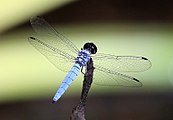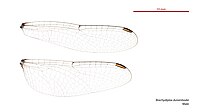Brachydiplax duivenbodei
| Darkmouth | |
|---|---|

| |
| Male | |

| |
| Female | |
| Scientific classification | |
| Kingdom: | Animalia |
| Phylum: | Arthropoda |
| Class: | Insecta |
| Order: | Odonata |
| Infraorder: | Anisoptera |
| Family: | Libellulidae |
| Genus: | Brachydiplax |
| Species: | B. duivenbodei
|
| Binomial name | |
| Brachydiplax duivenbodei | |

| |
| Synonyms | |
|
Perithemis duivenbodei Brauer, 1866 | |
Brachydiplax duivenbodei is a species of dragonfly in the family Libellulidae.[3] It is known by the common name darkmouth.[4] It is native to Indonesia, the Solomon Islands, and Queensland in Australia.[1]
Description
Males of this species are typical in colour for the genus, being bright powder blue on both the thorax and abdomen whereas females lack the pruinescence. The labrum is brown to black, thus giving the species its common name of darkmouth, as opposed to the similar palemouth (Brachydiplax denticauda). This species usually has seven antenodal crossveins in the fore-wing and six antenodal crossveins in the hind-wing. It is small in size with a wingspan of 40 to 60 millimeters. Though brightly coloured, the males often go unnoticed by an observer once they land on a lily pad or similar place.[5]
Habitat
This species can be found in habitat with still and slow-moving waters.[1]
Gallery
References
- ^ a b c Kalkman, V.J. (2020). "Brachydiplax duivenbodei". IUCN Red List of Threatened Species. 2020: e.T163884A83378289. doi:10.2305/IUCN.UK.2020-1.RLTS.T163884A83378289.en. Retrieved 19 November 2021.
- ^ Brauer, F. (1866). "Beschreibungen neuer exotischer Libellen". Verhandlungen der Zoologisch-Botanischen Gesellschaft in Wien (in German). 16: 563–570 [569] – via Biodiversity Heritage Library.
- ^ "Species Brachydiplax duivenbodei (Brauer, 1866)". Australian Faunal Directory. Australian Biological Resources Study. 2012. Retrieved 28 February 2017.
- ^ Brachydiplax duivenbodei. Atlas of Living Australia.
- ^ Theischinger, G; Hawking, J (2006). The Complete Field Guide to Dragonflies of Australia. Collingwood Vic.: CSIRO Publishing. p. 270. ISBN 978 0 64309 073 6.
Error: "Q934222" is not a valid Wikidata entity ID.
- CS1 German-language sources (de)
- Articles with short description
- IUCN Red List least concern species
- Articles with 'species' microformats
- Commons category link is defined as the pagename
- Taxonbars desynced from Wikidata
- Taxonbar pages requiring a Wikidata item
- Taxonbars with invalid from parameters
- Taxonbars without secondary Wikidata taxon IDs
- Libellulidae
- Odonata of Oceania
- Odonata of Australia
- Insects of Indonesia
- Taxa named by Friedrich Moritz Brauer
- Insects described in 1866



